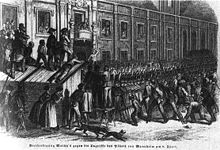mob
“Mob” is an old, disparaging, polemical abuse word that was used to discredit other people who did not conform to the prevailing culture. The elitist undertone is expressed today in the verb “pöbeln” and is intended to justify exclusion from democratic discourse.
Origin and use

The term pöbel ( mhd. Povel, bovel ) was borrowed from the old French ( poble ) in the Middle Ages . He referred to servants or simple people. This old French word goes back etymologically like the then coexisting peuple " people " back to the Latin word populus "people". The word "rabble" usually implies a lack of culture , sophistication , intelligence , style , sensitivity, or a "sense of higher things".
This is followed by the verb "(an) pöbeln", which is generally understood to mean a very vulgar " turn on " with an insulting effect.
The ochlocracy is translated with mob rule.
history
In his work “Against the robbery and murderous groups of farmers” (1525), Martin Luther gave the violence against the “rabble” a divine justification: “The donkey wants to be beaten and the rabble wants to be ruled by force. God knew that, so he didn’t give the authorities a foxtail, but a sword. ”In the 19th century, the word“ rabble ”was still used for the“ class below class honor ”, according to the social historian Werner Conze .
In his lectures on the basic lines of the philosophy of law (1820) by Georg Wilhelm Friedrich Hegel , the “rabble” appears in the section on the police (Die bürgerliche Gesellschaft, § 244/245). In the history of democracy, the reference to the “rabble” was a justification for the exclusion from the right to vote. In 1831, the Prussian reformer Freiherr vom Stein warned the provincial parliament of Westphalia about the danger “arising from the growth in the number and demands of the lowest classes in bourgeois society. In the cities this class consists of the homeless, propertyless mob, in the country it consists of the mass of little kötter, brinkitzer, new farmer, resident, hirelings; it nourishes and harbors envy and greed ”.
In 1844, the entrepreneur Friedrich Harkort declared in his pamphlet “Comments on the obstacles to civilization and the emancipation of the lower classes” that it was about “rescuing the proletarians from the shame and misery of the mob”. On the other hand, while studying Hegel's philosophy of right , Karl Marx developed the concept of the proletariat , to which he ascribed a historical role in the realization of philosophy. Empirically, in the labor movement, the term “proletariat” was used to distinguish the hard-working, educative and organizational part of the people from the rest of the “rabble”, for whom Marx coined the word lumpenproletariat .
Related terms
- Without a pejorative aftertaste , the now outdated verb pöblieren (also peuplieren ) is for “populate” or “colonize”, which was used in the time of absolutism or mercantilism and also afterwards in connection with a population policy that was based on population growth an area - especially through planned immigration - was directed ( state expansion ).
- Since the eighties of the 20th century, the term "Proll" (from Prolet ) has been used similarly to the disparaging mob .
- Janhagel as an outdated North German expression for the mob.
See also
- scum
- Baggage
- Cur (rabble)
- Lighters
- Lumpenproletariat
- Mass (sociology)
- Mob (people)
- Plebeians , term from which “mob” is often derived from a folk etymology
- Precariat
- Stand order
- Lower class
literature
- Sidonia Blättler: The rabble, the women etc. The masses in the political philosophy of the 19th century. Academy, Berlin 1995, ISBN 978-3-05-002892-7 .
- Renate Reschke: "Mob mish-mash" or the necessary decline of all culture. in: Between fear metaphor and term. Theories of mass culture since Nietzsche. Edited by Norbert Krenzlin . Akademie, Berlin 1992, ISBN 978-3-05-002065-5 , pp. 14–42.
- Frank Ruda: Hegel's rabble. An examination of the "Basics of the Philosophy of Law". Konstanz University Press, Paderborn 2011, ISBN 978-3-86253-010-6 .
Web links
Individual evidence
- ↑ Werner Conze, From “Mob” to “Proletariat”. Social historical prerequisites for socialism in Germany in: Vierteljahrshefte für Zeitgeschichte (4/1956)